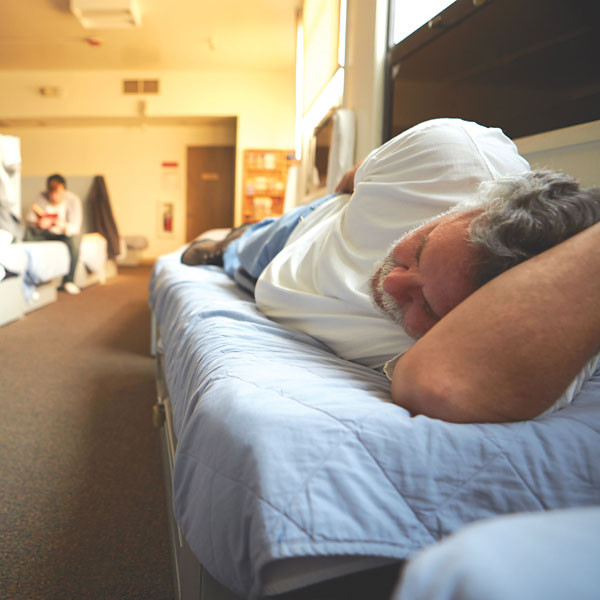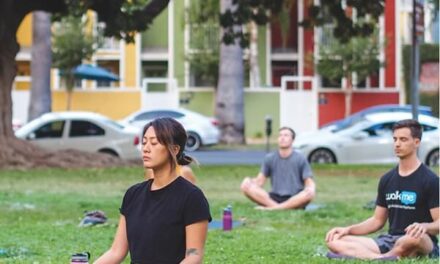Treatment First
Recall homelessness? GOP hopefuls have ideas
By Manuela Tobias
September 2021
The Gavin Newsom recall began as a referendum on the governor’s handling of the pandemic. But homelessness has become a critical issue for Republican candidates eager to replace Newsom in this month’s special election.
Businessman John Cox has been hauling an 8-foot ball of garbage around California to symbolize “the trash that’s left behind” by homeless people.

Kevin Faulconer, former San Diego mayor, named homelessness as his No. 1 issue. He released ads showing people camped in cars and tents in “Newsom’s California.”
Celebrity Caitlyn Jenner claimed her neighbor moved to Arizona because he couldn’t handle seeing homeless people.
Los Angeles radio talk show host Larry Elder believes homeless individuals need “true compassion” and not merely shelter beds or hotel rooms, which he calls “warehousing.”
Newsom made reducing homelessness a key part of his 2018 gubernatorial campaign, but the unsheltered population has only increased—up by 24 percent from 2018 to about 161,000 people in 2020.
The increase comes after the state spent $13 billion on homelessness since 2018. A scathing state auditor’s report points to a lack of coordination and accountability across the web of state agencies, counties, cities and service providers.
Are Republican ideas better? Their campaigns reflect a strategy of intervention and holding homeless people accountable. Some experts warn such proposals could worsen the lives of people experiencing homelessness.
Doug Ose, a former Sacramento member of Congress running to unseat Newsom, says, “We need to stop enabling, excusing and ignoring these drug addiction and mental health issues.”
Ose wants to make it easier to bring homeless people into state custody and establish enough community care centers to treat drug addiction and mental illness.
“First, you’ve got to have treatment first, not housing first. Treatment first,” he says.
In his homelessness plan, Cox cites a Heritage Foundation blog post pointing to a study of “Treatment First” facilities that found nearly half the participants recovered from substance use, entered housing and maintained steady employment.
Neither Cox nor Ose has put a price tag on treatment. But it’s likely far higher than simply providing beds for people, as the current “Housing First” shelter model does.
Several candidates in the Newsom recall mention using conservatorships, or legal guardianships, to force people into treatment. Both Cox and Ose suggest loosening the Lanterman-Petris Short Act, which limits involuntary treatment to those who are a danger to themselves or others, or gravely disabled, and restricts confinement time.
Ose wants to include anyone “addicted to drugs” and unwilling or unable to “make reasoned decisions consistent with being self-sufficient.”
Cox says, “Britney Spears doesn’t need a conservator. Thousands of Californians living on the streets are the ones that need conservatorships. And we have to force people to do it.”
Newsom and others have called for limited expansion of conservatorships. Supporters argue it’s difficult to get needed help for afflicted relatives under the strict definition of conservatorship. Others say the outdated system doesn’t address the needs of people dealing with substance abuse.
Kevin Baker of the American Civil Liberties Union says the candidates’ proposals raise serious concerns, and not just about violations of civil liberties. Expanding conservatorships would take “an army” of lawyers, judges and guards the state doesn’t have, he says.
“If you put somebody in a conservatorship, they’re yours. You have to house, clothe and feed them. You have all the obligations to them that you have to prisoners,” he says.
Faulconer wants an audit into the need for mental health services and how the state is spending money. His main idea is to create enough shelter beds to get everyone on the streets inside with services, including mental health treatment. Under his plan, if space in a shelter is available, a homeless person must take it.
As for the price, Faulconer says, “The cost of not doing it is extraordinary. People are literally dying on our streets. And my whole plan is about giving people the ability to get off the streets, out of an unclean, unsafe, unsanitary environment into one that is supportive with the services that they need.”
Faulconer cites a 12-percent reduction in homelessness in San Diego as evidence that shelters work. Local critics have questioned that record.
While Newsom has added record numbers of shelter beds in the past year, he prioritized more expensive individual hotel rooms, as opposed to the large shelters Faulconer suggests.
Elder, who downplays his GOP connections, says, “I have a newsflash for Newsom: Herding the homeless in barracks or hotels is simply warehousing our brothers and sisters who need true compassion to return them to self-sufficiency.”
Cox proposes doing away with shelters, saying they are a waste of money. Many advocates agree. Shelters aren’t affordable housing, so continuing to invest in shelters doesn’t fix the underlying cause of homelessness.
While advocates and researchers acknowledge existing shelter beds go unused, they blame the rules. Many shelters have curfews and don’t allow people to sleep with partners, bring pets or store belongings.
There are several points where the candidates align, primarily the push to “clean up” the state. Newsom proposed more than $1 billion in the state budget to pick up trash along freeways and downtown areas.
The candidates also agree California needs more housing for everyone, not just homeless people. That’s the same argument Newsom has been making since his 2018 campaign.
Manuela Tobias can be reached at manuela@calmatters.org. She covers housing for CalMatters, a nonpartisan, nonprofit journalism venture that partners with media outlets across California to report on state policy.















